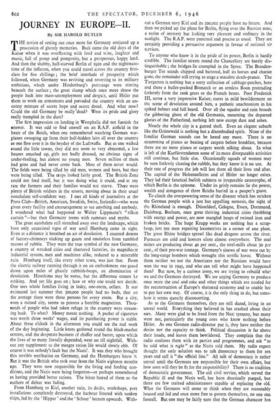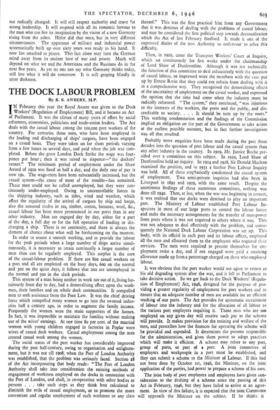JOURNEY IN EUROPE-II.
By SIR HAROLD BUTLER
THE notion of setting out once more for Germany conjured up a procession of ghostly memories. Back came the old days of the Kaiser when it was overflowing with food and w:ne, laughter and music, full of pomp and pomposity, but a prosperous, happy land. And then the shabby, half-starved Berlin of 1920 and the nightmare- time of the inflation, when you could travel across the country first- class for five shillings ; the brief interlude of prosperity which followed, when Germany was reviving and reverting to its military ambitions, which under Hindenburg's patronage were stirring beneath the surface ; the great slump which once more threw the people back into mass-unemployment and despair, until Hitler put them to work on armaments and pervaded the country with an un- canny mixture of secret hope and secret dread. And what now? Could the old Germany be really 'dead? Were its pride and glory really trampled in the dust?
The first impression on landing in Westphalia did not furnish the answer. It was odd to find oneself on an R.A.F. airfield in the heart of the Reich, when one remembered watching German war- planes swooping up from their half-hidden lairs all over the country as one flew over it in the heyday of the Luftwaffe. But as one walked round the little towns, they did not seem so very abnormal, a few houses smashed up, girls not badly dressed, no obvious signs of under-feeding, but almost no young men. Seven million of them had gone and had never come back. Most of them never would. The fields were being tilled by old men, women and boys, but they were being tilled. The crops looked fairly good. The British Zone could not feed itself, but it was doing what it could, and at any rate the farmers and their families would not starve. There were plenty of British soldiers in the streets, moving about in their usual nonchalant self-confident way. I met all kinds of journalists at the Press Club—British, American, Swedish, Swiss, Icelandic—who were given every facility and encouragement to see anything and anybody. I wondered what had happened to Walter Lippmann's "silken curtain "—but then Germany teems with rumours and myths.
The great autobahns still stretched away over the landscape, which bore only occasional signs of war until Hamburg came in sight. Even at a distance it breathed an air of desolation. I counted dozens of factory-chimneys sticking up gaunt and smokeless from tumbled masses of rubble. They were the true symbol of the new Germany, a country of wrecked cities and shattered factories, its magnificent industrial system, men and machines alike, reduced to a miserable ruin. Hamburg itself, like every other town, was just that. From the electric railway running through it on an embankment one gazed down upon miles of ghastly rubbish-heaps, an abomination of desolation. Hiroshima may be worse, but the difference cannot Le striking. And yet life goes on ; how or why one could not decide. One sees whole families living in leaky, one-room, cellars. It was estimated last summer that 3oo,000 people had no beds, that on the average there were three persons for every room. But a city, even a ruined city, seems to possess a horrible magnetism. Thou- sands of people who had taken refuge in the country were stream- ing back. To what? Money meant nothing. A packet of cigarettes was worth three weeks' wages, and its purchasing power is stable. About three o'clock in the afternoon you could see the real work of the day beginning. Little knots gathered round the black-market centres, and the desperate business of chaffer and barter, upon which the lives of so many literally depended, went on till nightfall. With- out any supplement to the meagre ration life would slowly ebb. Of course it was nobody's fault but the Nazis'. It was they who brought this terrible retribution on Germany, and the Hamburgers knew it. But it was the British who took over from the Nazis eighteen months ego. They were now responsible for the living and feeding con- ditions, and the Nazis were being forgotten—or perhaps remembered as having provided better rations. The bitter hatred of them as the authors of defeat was fading.
From Hamburg to Kid, another ruin, its docks, workshops, port installations completely destroyed, the harbour littered with sunken ships, led by the ' Hipper ' and the ' Scheer ' bottom upwards. With-
out a German navy Kid and its 200,000 people have no future. And then we picked up the plane for Berlin, flying over the Russian zone, a realm of mystery but looking very pleasant and ordinary in the sunlight. The R.A.F. were punctual and precise as usual. They are certainly providing a persuasive argument in favour of national air services.
To anyone who knew it in the pride of its power, Berlin is hardly credible. The familiar streets round the Chancellery are barely dis- tinguishable; the bridges lie crumpled in the Spree. The Branden- burger Tor stands chipped and battered, half its horses and chariot gone, the remainder still trying to stage a macabre death-prance. The Tiergarten is nothing but a sorry collection of cabbage-patches, here and there a bullet-pocked Bismarck or an armless Roon protruding forlornly from the rank grass or the French beans. Poor Frederick III, never a very impressive Kaiser, stares in mild bewilderment on the scene of desolation around him, a pathetic anachronism in his spiked helmet and full beard. Over all the squalor and ruin broods the gibbering ghost of the old Germania, mourning the departed glories of the Fatherland, nothing left now except dust and ashes.
Nearly the whole city is a gutted shell. Even an elegant suburb like the Griinewald is nothing but a disembodied spirit. None of the familiar German sounds can be heard any more. There is no strumming of pianos or beating of carpets before breakfast, because there are no more pianos or carpets worth talking about. In what is left of the Kurffirstendamm some of its more disreputable activities still continue, but little else. Occasionally squads of women may be seen listlessly clearing the rubble, but they know it is no use. At their rate of progress the job will last them all their lives and after. The capital of the Hohenzollerns and of Hitler no longer exists. They led their fanatical foolish subjects to irreparable catastrophe, of which Berlin is the epitome. Under its grisly remains lie the power, wealth and arrogance of three Reichs buried in a pauper's grave.
To clinch the overpowering sense of the disaster which has stricken the German people with a just but appalling nemesis, the sight of the Rhineland is enough. Diisseldorf, Cologne, Essen, Dortmund, Duisburg, Bochum, once great thriving industrial cities throbbing with energy and power, are now mangled heaps of twisted iron and broken bricks. The huge Krupp works are nothing but a scrap- heap, just 500 men repairing locomotives in a corner of one plant. The great Rhine bridges sprawl like dead dragons across the river. Furnaces are cold and hooters silent almost everywhere. The coal mines are producing about 40 per cent., the steel-mills about 30 per cent., of their pre-war tonnage. Germany's sinews of war were cut by the long-range bombers which wrought this terrific havoc. Without rhem neither we nor the Americans nor the Russians would have won the war in 1945, and who can tell what might have happened then? But now, by a curious irony, we are trying to rebuild what we and the Germans destroyed. We are urging Germany to produce once more the coal and coke and other things which are needed for the reconstruction of Europe's shattered economy and to enable her to pay her own way. Of course, it is the only thing to do, but some- how it seems queerly disconcerting.
As to the Germans themselves, they are still dazed, living in an unreal world. Everything they believed in has crashed about their ears. Many were glad to be freed from the Nazi tyranny, but many were not, particularly the young ones who knew nothing before Hitler. As one German radio-director put it, they have neither the desire nor the capacity to think. Political discussion is far above their heads, and leaves them bewildered. They complain that the radio confuses them with its parties and programmes, and ask "to be told what is right" as the Nazis told them. My radio expert thought the only solution was to talk democracy to them for ten years and call it "the official line." All talk of democracy is rather unreal until the Germans are responsible for their own affairs, but how soon will they be fit for the responsibility? There is no tradition of democratic government. The old civil service, which served the Republic ill and the Nazis well, has been drastically purged, but there are few trained administrators capable of replacing the old. What the Germans will come to think when they are reasonably housed and fed and once more free to govern themselves, no one can foretell. But one may be fairly sure that the German character has not radically changed. It will still respect authority and crave for strong leadership. It will respond with all its romantic fervour to the man who can fire its imagination by the vision of a new Germany rising from the ashes. Hitler did that once, but in very different circumstances. The apparatus of military and industrial power systematically built up over sixty years was ready to his hand. It now lies smashed to pieces. This fact alone may turn the German mind away from its ancient love of war and power. Much will depend on what we and the Americans and the Russians do in the next five years. As yet no one can say what Germany thinks today, still less what it will do tomorrow. It is still groping blindly in utter darkness.



































 Previous page
Previous page